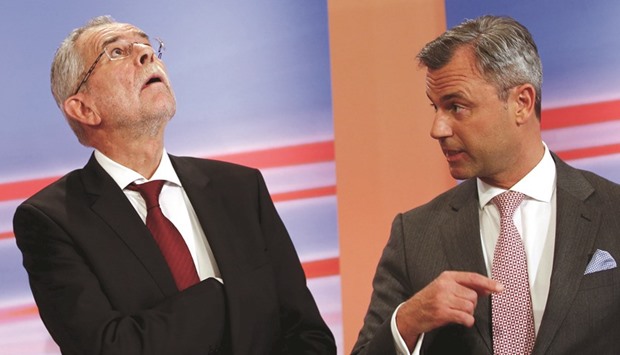Austria’s anti-immigration far-right triumphed yesterday in the first round of presidential elections, dealing a rude wake-up call to Vienna’s cosy political establishment two years before the next scheduled general election.
Norbert Hofer of the Freedom Party (FPOe) won 35.3% of the vote, projections showed, while candidates from the two governing parties failing to even make it into a second-round run-off on May 22, projections showed.
“This is the beginning of a new political era,” FPOe leader Heinz-Christian Strache said after what constitutes the best-ever result at federal level for the former party of the late, SS-admiring Joerg Haider.
“One thing has become clear here – a huge and massive dissatisfaction with the government ... I am convinced that as president, Norbert Hofer will act as protector of the Austrian people,” he said.
The result means that for the first time since 1945, Austria will not have a president backed by either Chancellor Werner Faymann’s Social Democrats (SPOe) or their centre-right coalition partners the People’s Party (OeVP).
The centre-right OeVP’s candidate Andreas Khol came fourth with 11.2%, just ahead of SPOe’s Rudolf Hundstorfer on 10.9%.
Facing Hofer on May 22 is likely to be Alexander van der Bellen, backed by the Greens, who garnered 21.3%, or independent candidate Irmgard Griss, a former judge hoping to be Austria’s first female president, who won 18.7%.
The only candidate who fared worse than the main parties’ candidates was Richard Lugner, an 83-year-old construction magnate and socialite married to a former Playboy model 57 years his junior, who won 2.3%.
Support for the two main parties, which have between them run Austria since 1945, has been sliding for years and in the last general election in 2013 they only just garnered enough support to re-form their “grand coalition”.
The phenomenon of the rise of fringe parties has been mirrored across the continent, including in Spain, Britain and Germany.
“Like elsewhere in Europe, we are witnessing the downfall of the traditional parties,” political analyst Peter Hajek told AFP.
Leading opinion polls ahead of 2018 general elections with more than 30% is the FPOe, boosted by Europe’s migrant crisis despite a firmer line in recent months from Chancellor Werner Faymann’s government.
Austria no longer has the lowest unemployment rate in the European Union and Faymann’s coalition, in power since 2008, has bickered over structural reforms.
“In the past, the presidential election focused on personalities but this year political issues have also come into play. Hundstorfer and Khol will have to pay for their parties’ failings,” said Karin Cvrtila of pollster OGM.
Heads could roll in the current government if neither candidate makes it into the run-off, she said before the results were announced.
Reinhold Lopatka, head of the OeVP bloc in parliament, said that the result “means we definitely cannot go back to business as usual”.
“In my view this election was partly about personalities and on the other hand a protest vote,” Lopatka said.
Having a president in the Habsburg dynasty’s former palace in Vienna not from either of the two main parties could shake up the traditionally staid and consensus-driven world of Austrian politics.
Hofer – the “friendly face of the FPOe” who likes to carry his Glock gun in public – has threatened to fire the government if it fails to get tougher on migrants.
Van der Bellen, who will likely pose Hofer a stiff challenge on May 22, has said that he would refuse to swear in Strache as chancellor in 2018 if his party comes first in elections then.
“The role is like that of a sleeping giant who has a lot more authority than people are aware of,” legal expert Manfried Welan told AFP.

Presidential candidates van der Bellen (left) and Hofer are seen during a TV debate in Vienna.
